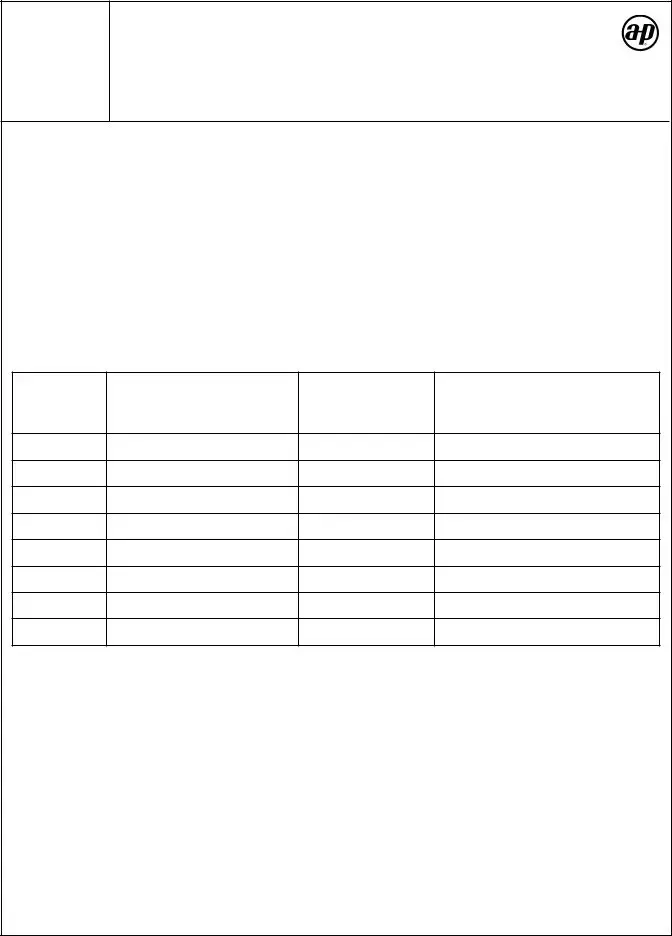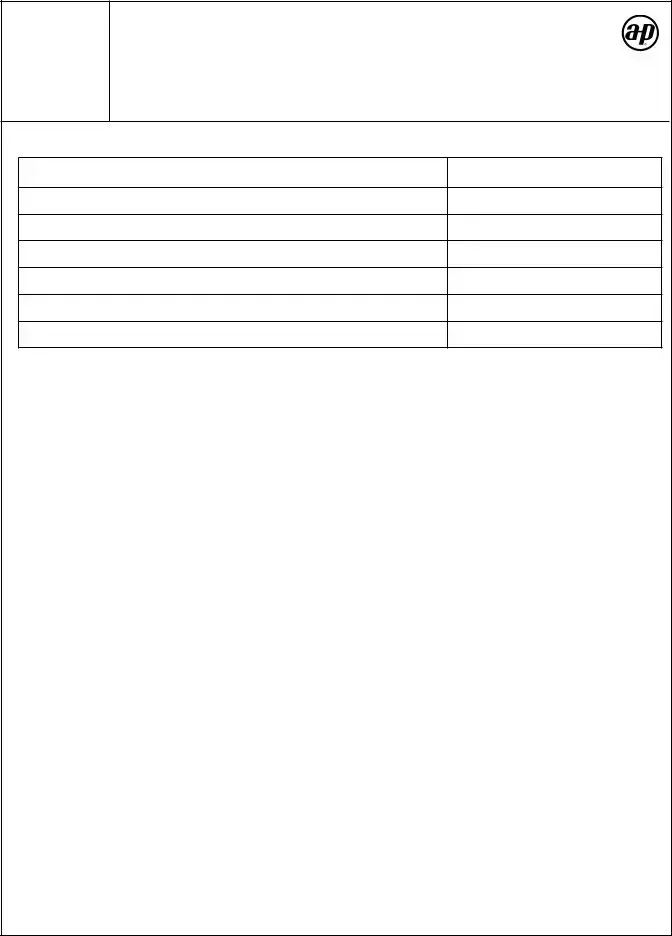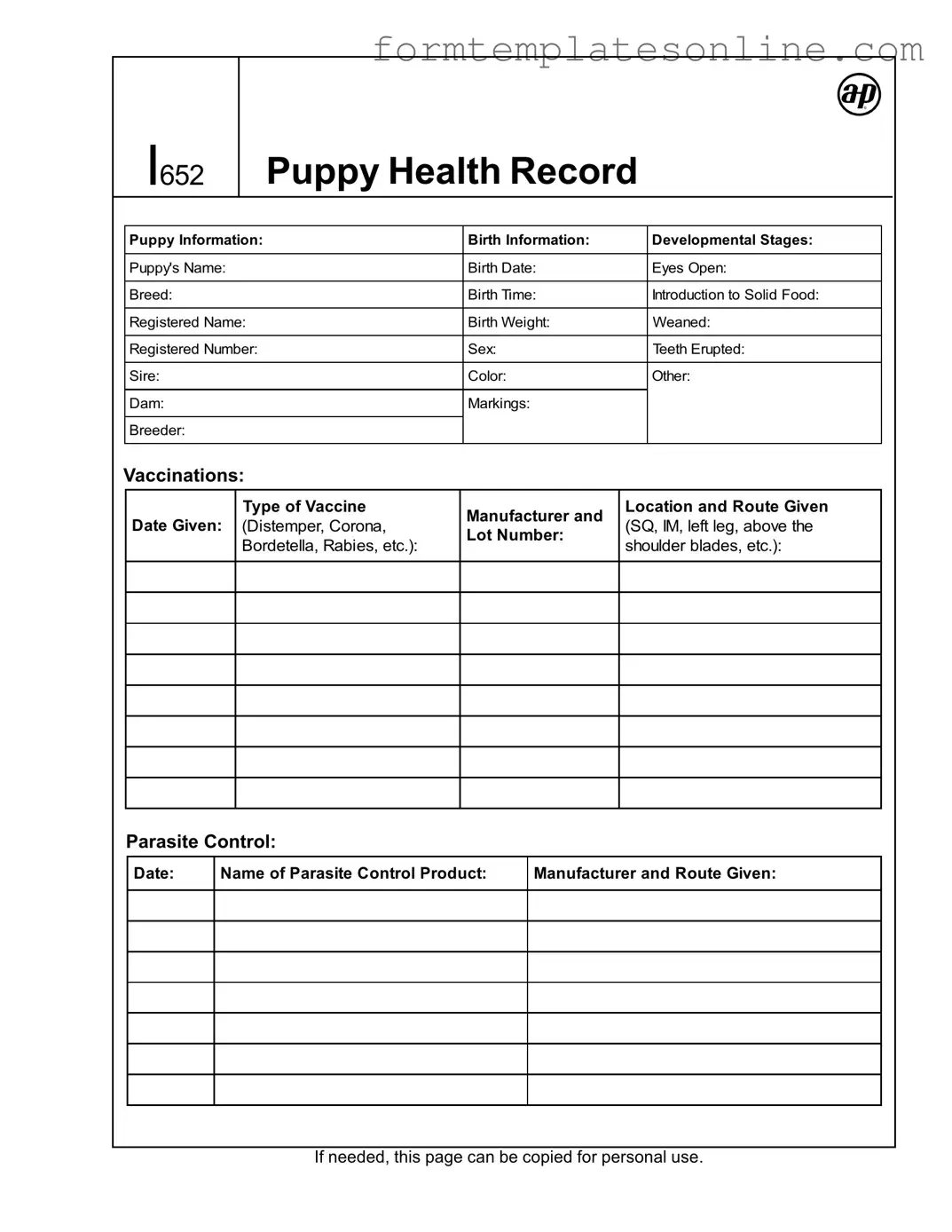Puppy Health Record PDF Form
The Puppy Health Record form is an essential tool for any new puppy owner. This document captures vital information about your puppy, including their name, breed, birth date, and weight. It also tracks important milestones in your puppy's early life, such as when they first opened their eyes, were weaned, and started eating solid food. The form includes sections for vaccinations, detailing the types of vaccines received, the dates they were administered, and the specific locations where they were given. Additionally, it documents parasite control measures, helping ensure your puppy remains healthy. Examinations or procedures performed by either the owner or a veterinarian can also be recorded, providing a comprehensive view of your puppy's health journey. The schedule of events from birth to spay or neuter outlines critical timelines for vaccinations and other health-related activities, making it easy to stay on track. This form not only serves as a record but also as a guide for responsible puppy care.
Common mistakes
-
Neglecting to fill out the puppy's basic information: Failing to include essential details such as the puppy's name, breed, and birth date can lead to confusion later. This information is crucial for tracking the puppy's health history.
-
Missing vaccination dates: It's vital to record the exact dates when vaccinations are administered. Missing this information can result in missed booster shots or lapses in protection against diseases.
-
Incorrectly noting the type of vaccines: Each vaccine serves a different purpose. Listing the wrong type can cause misunderstandings about the puppy’s health needs and may lead to insufficient protection.
-
Omitting parasite control details: Not recording the name and type of parasite control product used can hinder future treatments. This information is essential for ensuring the puppy is adequately protected against parasites.
-
Forgetting to note the veterinarian's findings: Any examinations or procedures performed should be documented. This includes comments from the veterinarian that may be critical for future health assessments.
-
Ignoring the schedule of events: The timeline from birth to spay or neuter is important. Missing this schedule can lead to delays in essential procedures and vaccinations.
-
Not tracking developmental stages: Keeping track of when the puppy's teeth erupt or when they start eating solid food is important for monitoring growth and development. Failing to do so can overlook potential health issues.
-
Using unclear abbreviations: If abbreviations are used, they should be defined. For example, stating “SQ” without clarification may confuse others who read the record.
-
Not making copies for personal use: It’s advisable to keep a personal copy of the health record. Failing to do so can lead to lost information, which is essential for the puppy’s ongoing care.
Example - Puppy Health Record Form

I652
PuppyHealthRecord
Puppy Information: |
Birth Information: |
DevelopmentalStages: |
|
|
|
Puppy's Name: |
BirthDate: |
Eyes Open: |
|
|
|
Breed: |
BirthTime: |
Introductionto Solid Food: |
|
|
|
Registered Name: |
BirthWeight: |
Weaned: |
|
|
|
Registered Num er: |
Sex: |
TeethErupted: |
|
|
|
Sire: |
Color: |
Other: |
|
|
|
Dam: |
Markings: |
|
|
|
|
Breeder: |
|
|
|
|
|
Vaccinations:
Date Given:
Type of Vaccine (Distemper,Corona, Bordetella,Ra ies,etc.):
Manufacturer and ot Number:
ocation and Route Given (SQ,IM,leftleg,a ove the shoulder lades,etc.):
ParasiteControl:
Date: |
Name of Parasite ControlProduct: |
Manufacturer and Route Given: |
|
|
|
|
|
|
|
|
|
|
|
|
|
|
|
|
|
|
|
|
|
|
|
|
Ifneeded,thispagecanbecopiedforpersonaluse.

I652
PuppyHealthRecord PAGE 2
ExaminationsorProceduresPerformedbyOwnerorVeterinarian:
Date: |
Findings and Comments: |
|
|
Owner or Veterinarian Initials:
Schedule of Events fromBirthtoSpayor Neuter
*Each vaccination should ideallybegivenatthree weekintervals.
**Thetimetobeginheart- worm medication can vary dependingontheproduct andtimeofyear.
***The
SeepagesA622andA905for parasitecontrolandvaccination suggestions.
Events |
Age |
Date |
|
|
|
Birthdate |
Day1 |
|
|
|
|
Dewclawremovaland taildock |
|
|
|
|
|
2 weeks |
|
|
|
|
|
Toenailtrim |
2 weeks |
|
|
|
|
Solid food introduction |
3 weeks |
|
|
|
|
4 weeks |
|
|
|
|
|
Toenailtrim |
5 weeks |
|
|
|
|
1stcar trip |
6 weeks |
|
|
|
|
1stshot |
|
|
|
|
|
Physicalexamination yvet |
|
|
|
|
|
6 weeks |
|
|
|
|
|
Weaning |
|
|
|
|
|
Move to cages |
7 weeks |
|
|
|
|
8 weeks |
|
|
|
|
|
Toenailtrim |
9 weeks |
|
|
|
|
2nd Shot* |
|
|
|
|
|
3rd Shot |
|
|
|
|
|
Beginheartwormmedication** |
|
|
|
|
|
12 weeks |
|
|
|
|
|
4thand finalshots |
|
|
|
|
|
Spayor neuter |
|
|
|
|
|
Ifneeded,thispagecanbecopiedforpersonaluse.
More About Puppy Health Record
What is the Puppy Health Record form used for?
The Puppy Health Record form is a comprehensive document that tracks important information about your puppy’s health and development. It includes details such as birth information, vaccinations, parasite control, and examinations performed by a veterinarian or owner. This record helps ensure your puppy receives appropriate care and vaccinations at the right times.
What information do I need to fill out on the form?
You will need to provide various details about your puppy, including its name, breed, birth date, weight, and color. Additionally, you should document vaccination dates, types of vaccines administered, and any parasite control products used. Keeping this information organized is crucial for your puppy's health management.
How often should vaccinations be given according to the form?
The form recommends that each vaccination ideally be given at three-week intervals. This schedule helps to build your puppy's immunity effectively. It’s important to follow this timeline closely to ensure your puppy is fully protected against common diseases.
What should I do if my puppy needs de-worming?
The form suggests de-worming your puppy at specific ages, particularly using pyrantel pamoate. You should follow the recommended schedule for de-worming, which generally starts at two weeks of age and continues at various intervals. If you have any concerns, consult your veterinarian for the best product and timing for your puppy.
Is there a specific schedule for introducing solid food?
Yes, the form indicates that solid food should be introduced at around three weeks of age. This is an important developmental stage for your puppy. Make sure to transition gradually and monitor your puppy’s response to the new diet to ensure they are adjusting well.
What if my puppy has not received all vaccinations by the recommended age?
If your puppy has not received all vaccinations by the recommended age, it’s crucial to consult your veterinarian. They can provide guidance on catching up on missed vaccinations and ensure your puppy’s health is not compromised. Delays can lead to increased vulnerability to diseases.
Can I make copies of the Puppy Health Record form?
Yes, the form includes a note stating that it can be copied for personal use. Keeping multiple copies can help you stay organized and ensure that you have records available for your veterinarian or for your own reference. Maintaining accurate records is essential for your puppy’s ongoing health care.
Key takeaways
Filling out and utilizing the Puppy Health Record form is essential for ensuring the health and well-being of a puppy. Here are key takeaways to consider:
- Accurate Information: Fill in the puppy's name, breed, birth date, and other identifying details accurately to maintain a clear health history.
- Tracking Vaccinations: Document each vaccination, including the date given, type of vaccine, and manufacturer. This helps in keeping track of the puppy's immunization schedule.
- Parasite Control: Record details about any parasite control products used, including the name and manufacturer. This information is vital for ongoing health management.
- Developmental Milestones: Note significant developmental stages, such as when the puppy's eyes open or when solid food is introduced. This helps monitor growth and development.
- Examinations: Include findings from any examinations or procedures performed by a veterinarian. This ensures a comprehensive health record.
- Owner's Role: Owners should actively participate in the puppy's health care by keeping the record updated with their observations and any treatments administered.
- Schedule of Events: Follow the recommended schedule for vaccinations and other health events. This includes de-worming and spaying or neutering.
- Consultation with Veterinarians: Regularly consult with veterinarians to ensure that the health record is up-to-date and that the puppy is receiving appropriate care.
- Personal Use: The form can be copied for personal use, allowing owners to maintain a consistent record for their puppy's health history.
Form Attributes
| Fact Name | Description |
|---|---|
| Puppy Information | The form collects essential details about the puppy, including its name, breed, birth date, and weight. This information helps track the puppy's growth and health over time. |
| Vaccination Records | It includes a section for documenting vaccinations. Owners must record the type of vaccine, date given, and the manufacturer. Keeping this information updated is crucial for the puppy's health. |
| Parasite Control | The form provides a space for recording parasite control treatments. Owners should note the product used and the date it was administered to ensure the puppy remains free of parasites. |
| Developmental Stages | Key developmental milestones are outlined in the form. These include the introduction of solid food, weaning, and the timeline for vaccinations and deworming. |
| Owner/Veterinarian Input | There is a section for findings and comments from either the owner or a veterinarian. This allows for personalized notes regarding the puppy's health and any procedures performed. |
| State-Specific Requirements | Some states may have specific laws regarding puppy health records. It is essential to check local regulations to ensure compliance with any additional requirements. |
Other PDF Forms
Create Own Invoice - Your go-to resource for free electronic invoices.
The Georgia Deed form is a crucial document used in real estate transactions within the state of Georgia. It legally transfers property ownership from the seller to the buyer. Understanding the details of this form is essential for anyone involved in buying or selling property in Georgia, and resources such as OnlineLawDocs.com can provide valuable information regarding its usage.
Dd Form 2870 Download - This form ensures health information is shared only with authorized personnel.
Dos and Don'ts
When filling out the Puppy Health Record form, it's essential to ensure accuracy and completeness. Here’s a list of things you should and shouldn’t do:
- Do provide accurate birth information, including the date and time of birth.
- Do include the puppy's registered name and any other names it may be known by.
- Do record all vaccinations, noting the type and date given.
- Do keep track of any findings from examinations performed by a veterinarian.
- Don’t leave any sections blank; all information is important for the puppy's health history.
- Don’t forget to note the manufacturer and lot number of vaccines administered.
- Don’t use abbreviations or shorthand that may confuse others reading the record.
- Don’t overlook the importance of documenting any parasite control treatments given.
